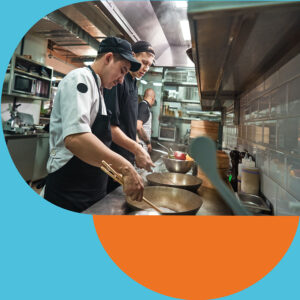
Our priority outcome: to increase in the number of people in education, training, volunteering or employment.
A sense of purpose is central to good mental health and many people get this from studying, work or volunteering. The Living Well Network Alliance works with partners to help people develop themselves as well as get into and sustain meaningful work and training.

Context and key challenges
Unfortunately, those with mental illness are less likely to be employed than the general population. In the last quarter of 2020/21 (the latest data available) 75 percent of the general population were employed, compared with just 51 percent of those with mental illness. Although the employment rate of those with mental illness has nearly doubled since 2008/9 when this data was first collected, this possibly reflects the increasing acceptance of mental illness in society generally (Supporting people in employment | Nuffield Trust, 2023)
The situation for those with severe mental illness (SMI) is far worse, with less than one in ten (8%) being employed according to NHS England (Community Mental Health Services, 2023).
We reviewed a number of our existing employment support contracts, involving people who use our services in this process, and concluded that they were not providing value for money. We ended these contracts and will use the money saved to reinvest in support for adult mental health in Lambeth.
What we offer
The Living Well Network Alliance provides a range of support to help people find jobs, and for those in work to keep their jobs. We also offer talking therapies, psychiatric and other day-to-day support to keep people well so they have the best chance of staying in training or employment. In addition, we provide some jobs themselves and access to jobs.
Individual Placement and Support (IPS) service
Our main employment support service is the new Individual Placement and Support (IPS) service, which was launched in summer 2022. This service works with anyone who we support that wants to work or stay in their job.
Employment Placements
We also provide a number of work placements with our close partner Mosaic Clubhouse. Known as Transitional Employment Placements (TEPs) these part-time, paid roles provide skills, references and above all, confidence for those looking to get into, or back into, paid employment.
Our impact
In its first 12 months (July 2022 to June 2023) the IPS service has worked with 247 people with serious mental illness to seek employment. IPS has successfully supported 47 of these people into paid employment, in roles ranging from nursing, marketing and engineering. All the jobs we support people into are things that they are interested in and pay at least the London Living Wage.
Our next steps
New Individual Placement and Support (IPS) Service
We will continue to develop our IPS service, supporting more people into paid employment and more people to stay in employment.
We will also continue to employ people though Mosaic’s TEP programme. These provide important experience, skills and confidence to get people into, or back into, paid employment.
We will explore how we can introduce entry level jobs so that we can ‘grow our own’, developing and training people on the job.
Case study: Rose

“Rose has bipolar disorder and long-term physical disabilities. During her employment assessment, she expressed the desire to work in a kitchen and hotel setting because she likes cooking and cleaning and would prefer not to engage with customers. We supported her to create a CV and sent it to some of our biggest employment partners in the borough. She was invited to many interviews and our senior employment specialist helped her prepare for these.
“Despite Rose contending heavily with her mental health during this time, she persevered. And we continued to keep her motivated with daily calls of reassurance, encouragement, and emotional support.
“Rose was offered some jobs but turned them away because she didn’t feel comfortable with the people she was interviewed by.
“Eventually she was invited by a hotel in Covent Garden for an interview and trial shift. This time we accompanied her for moral support. She was very nervous but did very well in the interview and was offered the job as kitchen porter. She accepted the offer and is now in full time employment.”
Senior Employment Specialist, Living Well North